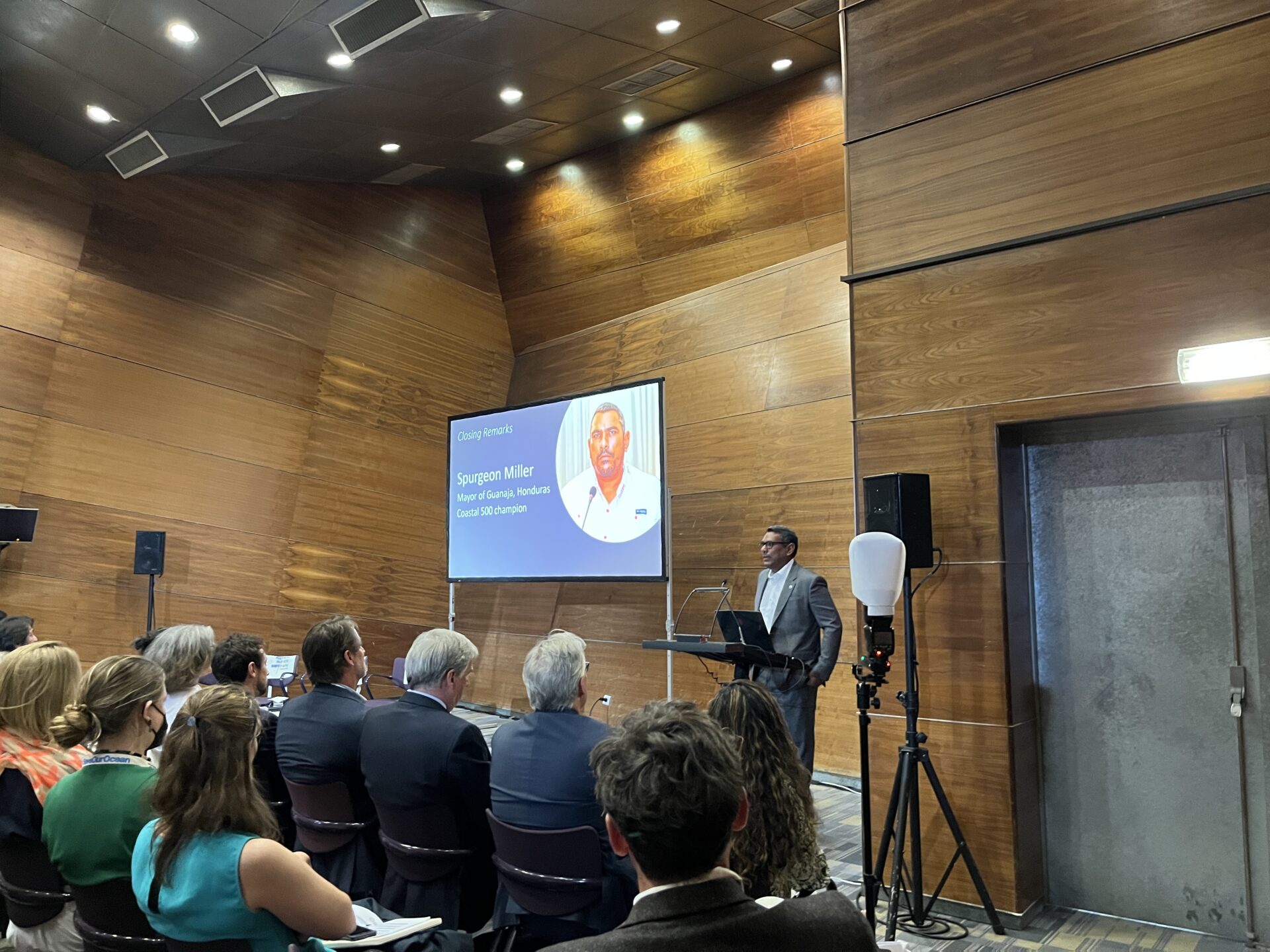The UN Ocean Conference (UNOC) concluded last week in Lisbon, Portugal. Originally scheduled for 2020, this long-awaited milestone brought the ocean community together to discuss implementation of Sustainable Development Goal 14: the conservation and sustainable use the ocean and marine resources. The political outcome of UNOC was the adoption of the “Our Ocean, Our Future, Our Responsibility: Lisbon Declaration,” which included a call for an ambitious, practical, and transformative post-2020 global biodiversity framework, and noted more than 100 countries have already committed to conserve or protect at least 30% of the global ocean by 2030 (30×30).
Together with partners, Rare used UNOC to make the case for more attention and resources for the territorial seas in achieving 30×30. This thin band of ocean extending 12 nautical miles from shore makes up just six percent of the ocean but is home to 70 percent of its biodiversity. The territorial seas are vital for livelihoods, food security, and climate resilience impacting millions of people. Rare and our partners are among the leading voices for empowering coastal communities, preserving territorial seas, and strengthening ocean climate action.
Here are four takeaways from UNOC:
- Local leaders helped humanize the case for territorial seas. Spurgeon Miller, Mayor of Guanaja, Honduras and a Coastal 500 champion, joined Rare’s delegation in Lisbon and helped elevate the critical role municipal governments and local leaders play in safeguarding the ocean. Mayor Miller demonstrated how the Coastal 500 network harnesses the power of collective action from local leaders across the globe which increases action and awareness at the local level while driving greater ambition on key issues at the global and national level.
- Why it matters: The Coastal 500, which Rare helped launch last year, earned significant visibility. Mayor Miller spoke during the UNOC plenary session and a number of other events throughout the week. Governments, funders, and NGOs recognize the power and value of Coastal 500, as it establishes itself as a go-to representation of the local coastal community perspective.

- Why it matters: The Coastal 500, which Rare helped launch last year, earned significant visibility. Mayor Miller spoke during the UNOC plenary session and a number of other events throughout the week. Governments, funders, and NGOs recognize the power and value of Coastal 500, as it establishes itself as a go-to representation of the local coastal community perspective.
- The case for territorial seas in achieving 30×30 resonated across the UNOC. The momentum for the territorial seas was palpable. Our side event on this topic, co-hosted with Wildlife Conservation Society, Environmental Defense Fund and Blue Action Fund, touched on key issues such as bringing marginalized voices to the table and engaging youth as a force for meaningful and sustainable change at the local level. These messages resonated throughout UNOC, and were reiterated by the recent G7 Ocean Deal, which included a commitment to supporting effective ecosystem-based approaches to fisheries management, as well as achieving 30×30 through Marine Protected Areas and Other Effective area-based Conservation Measures.
- Why it matters: While all ocean areas including those outside of national jurisdiction are important to protect, the territorial seas are key to successfully achieving SDG 14, as well as SDG 1 (no poverty), SDG 2 (zero hunger), and SDG 13 (climate action). Nearly 500 million people directly depend on the small-scale fisheries, most of which are found within these areas.
- Ocean is a MUST for climate action. On the heels of the first annual Ocean and Climate Change Dialogue under the UNFCCC, the UN Ocean Conference reaffirmed the linkage between action on climate change and action to protect the ocean. Ocean climate champions highlighted the ocean climate nexus and the protection and sustainable management of blue carbon ecosystems. Both mitigation and adaptation actions are both vitally important for ocean climate action. The link between ocean action and climate action is increasingly felt at the local level and acknowledged at the global level.
- Why it matters: Engaging small-scale fishers and fishing communities and empowering them with tools and resources for sustainable management is increasingly being recognized as critical to climate solutions. Rare’s expertise in community engagement and resilience building, like that of our Fishing for Climate Resilience initiative, will support this momentum on the road to Sharm el-Sheikh (UNFCCC COP27), Montreal (CBD COP15), and beyond. We must put coastal communities at the heart of the decision process to ensure these actions are good for people, nature and the climate.
- Ocean financing must increase and flow to local communities. While territorial seas are where high human use meets high biodiversity, less than 15% of ocean philanthropy is dedicated to community-based coastal habitat conservation and small-scale fishing issues. Throughout the conference, developing countries reiterated the need for more resources. Other stakeholders called for those financial resources to flow to the local coastal communities who feel the impact of inaction but are often responsible for implementation. Big coalitions of private foundations announced new funding to address this gap, such as the Protecting Our Planet Challenge announcing $1 Billion USD so support the “creation, expansion and management of MPAs and Indigenous and locally governed marine and coastal areas by 2030.”
- Why it matters: The increased attention about financing flows and what is needed to ensure they reach local communities creates a demand for organizations with a strong track record of engaging coastal communities. Rare calls on all Parties and other stakeholders to amplify how increased financial and technical resources are critical for effective implementation of locally-led MPAs in coastal, territorial waters.
